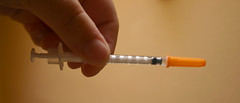| 5454155324 | consciousness | our awareness of ourselves and our environment |  | 0 |
| 5454155325 | circadian rhythm | the biological clock; regular bodily rhythms that occur on a 24-hour cycle |  | 1 |
| 5454155326 | REM sleep | rapid eye moment sleep; a recurring sleep stage during which vivid dreams commonly occur. Also known as paradoxical sleep, because the muscles are relaxed (except for minor twitches) but other body systems are active |  | 2 |
| 5454155327 | alpha waves | the relatively slow brain waves of a relaxed, awake state |  | 3 |
| 5454155328 | sleep | periodic, natural loss of consciousness - as distinct from unconsciousness resulting from a coma, general anesthesia, or hibernation |  | 4 |
| 5454155329 | hallucinations | false sensory experiences, such as seeing something in the absence of an external visual stimulus |  | 5 |
| 5454155330 | delta waves | the large, slow brain waves associated with deep sleep |  | 6 |
| 5454155331 | NREM sleep | non-rapid eye movement sleep; encompasses all sleep stages except for REM sleep |  | 7 |
| 5454155332 | narcolepsy | a sleep disorder characterized by uncontrollable sleep attacks. The sufferer may lapse directly into REM sleep, often at inopportune times |  | 8 |
| 5454155333 | sleep apnea | a sleep disorder characterized by temporary cessations of breathing during sleep and repeated momentary awakenings |  | 9 |
| 5454155334 | night terrors | a sleep disorder characterized by a high arousal and an appearance of being terrified; unlike nightmares, night terrors occur during Stage 4 sleep, within two or three hours of falling asleep, and are seldom remembered |  | 10 |
| 5454155335 | dream | a sequence of images, emotions, and thoughts passing through a sleeping person's mind. Dreams are notable for their hallucinatory imagery, discontinuities, and incongruities, and for the dreamer's delusional acceptance of the content and later difficulties remembering it |  | 11 |
| 5454155336 | manifest content | according to Freud, the remembered story line of a dream (as distinct from its latent, or hidden, content) |  | 12 |
| 5454155337 | latent content | according to Freud, the underlying meaning of a dream (as distinct from its manifest content) |  | 13 |
| 5454155338 | REM rebound | the tendency for REM sleep to increase following REM sleep deprivation (created by repeated awakenings during REM sleep) |  | 14 |
| 5454155339 | hypnosis | a social interaction in which one person suggests to another that certain perceptions, feelings thoughts or behaviors will spontaneously occur |  | 15 |
| 5454155340 | posthypnotic suggestions | a suggestion, made during a hypnosis session, to be carried out after the subject is no longer hypnotized; used by some clinicians to help control undesired symptoms and behaviors |  | 16 |
| 5454155341 | dissociation | a split in consciousness, which allows some thoughts and behaviors to occur simultaneously with others |  | 17 |
| 5454155342 | psychoactive drug | a chemical substance that alters perceptions and moods |  | 18 |
| 5454155343 | tolerance | the diminishing effect with regular use of the same dose of a drug, requiring the user to take larger and larger doses before experiencing the drug's effect |  | 19 |
| 5454155344 | withdrawal | the discomfort and distress that follow discontinuing the use of an addictive drug |  | 20 |
| 5454155345 | physical dependence | a physiological need for a drug, marked by unpleasant withdrawal symptoms when the drug is discontinued |  | 21 |
| 5454155346 | psychological dependence | a psychological need to use a drug, such as to relieve negative emotions |  | 22 |
| 5454155347 | addiction | compulsive drug craving and use, despite adverse consequences |  | 23 |
| 5454155348 | depressants | drugs (such as alcohol, barbiturates, and opiates) that reduce activity and slow body functions |  | 24 |
| 5454155349 | barbiturates | drugs that depress the activity of the central nervous system, reducing anxiety but impairing memory and judgment |  | 25 |
| 5454155350 | opiates | opium and its derivatives, (such as morphine and heroin); they depress neural activity, temporarily lessening pain and anxiety |  | 26 |
| 5454155351 | stimulants | drugs (such as caffeine, nicotine, and more powerful amphetamines, cocaine, and ecstasy) that excite neural activity and speed up the body functions |  | 27 |
| 5454155352 | amphetamines | drugs that stimulate neural activity, causing sped-up body functions and associated energy and mood changes |  | 28 |
| 5454155353 | methamphetamine | a powerfully addictive drug that stimulates the central nervous system, with sped-up body functions and associated energy and mood changes; over time, appears to reduce baseline dopamine levels |  | 29 |
| 5454155354 | near-death experience | an altered state of consciousness reported after a close brush with death (such as cardiac arrest); often similar to drug-induced hallucinations |  | 30 |
| 5454155355 | THC | the major active ingredient in marijuana; triggers a variety of effects, including mild hallucinations |  | 31 |
| 5454155356 | homeostasis | a state of psychological equilibrium obtained when tension or a drive has been reduced or eliminated |  | 32 |
| 5454155357 | insomnia | recurring problems in falling or staying asleep |  | 33 |
| 5454155358 | activation-synthesis theory | theory that dreams reflect inputs from brain activation originating in the pons, which the forebrain then attempts to weave into a story |  | 34 |
| 5454155359 | biofeedback | a training program in which a person is given information about physiological processes (heart rate or blood pressure) that is not normally available with the goal of gaining conscious control of them |  | 35 |
| 5454155360 | meditation | the act of deep thinking or reflection |  | 36 |
| 5454155361 | ecstasy (MDMA) | a synthetic stimulant and mild hallucinogen. produces euphoria and social intimacy, but with short term health risks and longer-term harm to serotonin-producing neurons and to mood and cognition |  | 37 |
| 5454155362 | hallucinogens | psychedlic drugs, such as LSD, that distort perception and evoke sensory images in the absence of sensory input |  | 38 |
| 5454155363 | LSD | a powerful hallucigenic drug; also known as acid |  | 39 |
| 5454155364 | Stanley Coren | found most humans will sleep 9 hours if uninterrupted |  | 40 |
| 5454155365 | William Dement | Sleep researcher who discovered and coined the phrase "rapid eye movement" (REM) sleep. |  | 41 |
| 5454155366 | Sigmund Freud | considered dreams the key to understanding our inner conflict |  | 42 |
| 5454155367 | Ernest Hilgard | believed hypnosis invovles not only social influences but also a special state of dissociation Hilgard's HYPNOSIS |  | 43 |
| 5454155368 | Albert Hofmann | a Swiss scientist known best for being the first person to synthesize, ingest and learn of the psychedelic effects of lysergic acid diethylamide (LSD) |  | 44 |
| 5454155369 | Nicholas Spanos | hypnosis researcher! |  | 45 |
AP Psychology Unit 5 Flashcards
Primary tabs
Need Help?
We hope your visit has been a productive one. If you're having any problems, or would like to give some feedback, we'd love to hear from you.
For general help, questions, and suggestions, try our dedicated support forums.
If you need to contact the Course-Notes.Org web experience team, please use our contact form.
Need Notes?
While we strive to provide the most comprehensive notes for as many high school textbooks as possible, there are certainly going to be some that we miss. Drop us a note and let us know which textbooks you need. Be sure to include which edition of the textbook you are using! If we see enough demand, we'll do whatever we can to get those notes up on the site for you!

